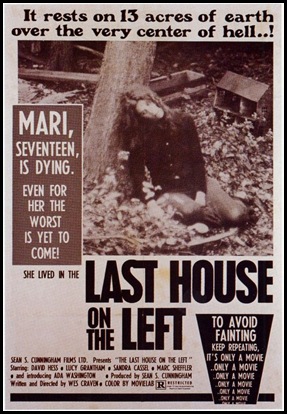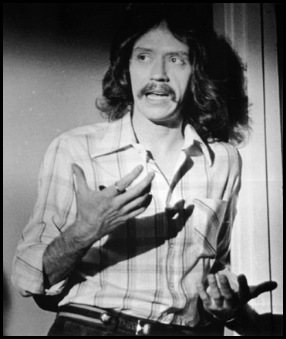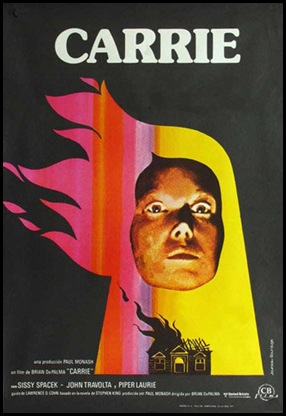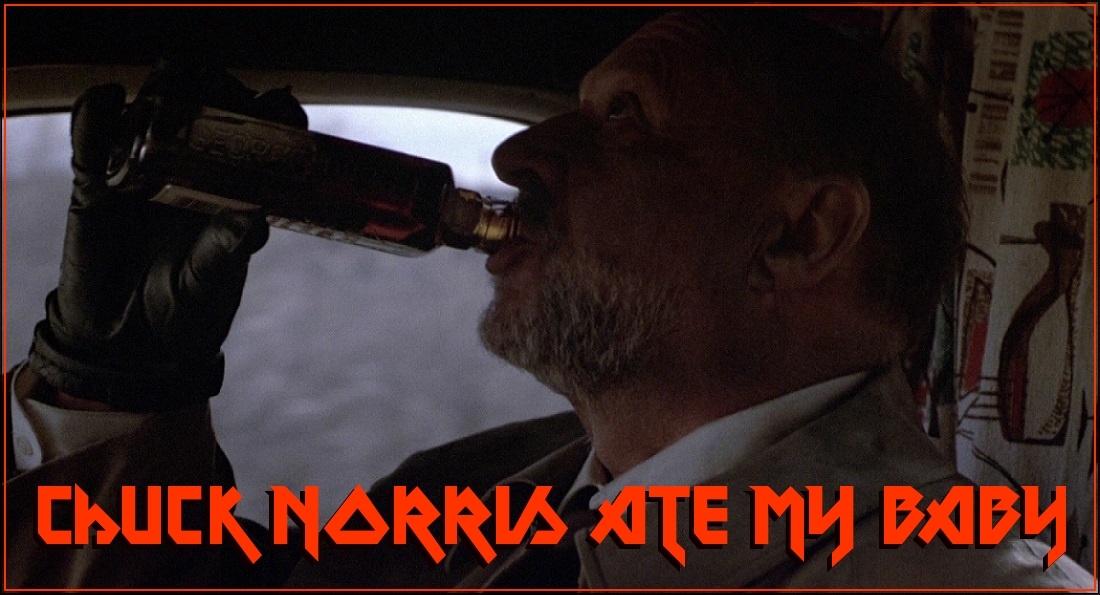A major transitional period occurred within the horror genre during the 1970s. At the time horror was a genre considered no more than a joke, drive-in fodder for teens to make out to, critics to dismiss, and studios to scoff at. This was a time when thoughts of peace and love were slowly dwindling and being replaced by anger, unease and uncertainty due to the effects of the Vietnam War and a growingly unstable America. These feelings began to show up on screens thanks to a handful of directors that wanted to take the genre in a direction that horror directors before them hadn't, while scaring audiences in a way that they may not have been prepared for. Regardless, these unsuspecting audiences were instinctively hungry for such a change, and they embraced these films as clearly proven by the box-office receipts and cultural impact they had.
 New York Times critic Jason Zinoman's book, Shock Value (The Penguin Press), is based off the idea that - while the likes of directors such as Martin Scorsese, Steven Spielberg, and Francis Ford Coppola were making a huge splash at the box-office and on critics - there were a handful of upcoming directors that took the horror genre and pushed it to the next level. Auteurs from John Carpenter, Wes Craven, Roman Polanski, Brian De Palma, and many others started a wave of what Zinoman describes as New Horror.
New York Times critic Jason Zinoman's book, Shock Value (The Penguin Press), is based off the idea that - while the likes of directors such as Martin Scorsese, Steven Spielberg, and Francis Ford Coppola were making a huge splash at the box-office and on critics - there were a handful of upcoming directors that took the horror genre and pushed it to the next level. Auteurs from John Carpenter, Wes Craven, Roman Polanski, Brian De Palma, and many others started a wave of what Zinoman describes as New Horror.
Zinoman intricately looks at how this New Horror replaced Old Horror and he does so by focusing on the directors and films directly responsible for such an impactful change in the genre. Shock Value is based on the shift that horror took from creature features and monster mash-ups - that people didn't take seriously anymore in a growingly jaded society – to tales of serial killers without a motive and unexplained occurrences that brought about an ambiguity as to the root of evil, which threw audiences into a frenzy and forever changed the landscape of the genre and how it was perceived.
 Zinoman ducks and dives into a flurry of narrative that nicely shifts from director to director, bouncing back and forth between each one, connecting them through their influences, their rebellious natures and how their upbringing and lives affected the movies they made, as well as the people around them. Where Shock Value is strongest is in the intriguing information covering the background of these directors and how their films came to be. I often found myself mesmerized by a slew of captivating facts and riveting stories involving directors and films that I love. The overprotective and religious upbringing of Wes Craven; William Castle being bounced from the directors chair in favor of a modern, respectable director in Roman Polanski (the passing of the torch from Old-to-New Horror, as Zinoman describes it); the rift between director John Carpenter and screenwriter Dan O'Bannon after they made Dark Star, and a slew of other vastly interesting stories and accounts that truly make Shock Value a worthy read.
Zinoman ducks and dives into a flurry of narrative that nicely shifts from director to director, bouncing back and forth between each one, connecting them through their influences, their rebellious natures and how their upbringing and lives affected the movies they made, as well as the people around them. Where Shock Value is strongest is in the intriguing information covering the background of these directors and how their films came to be. I often found myself mesmerized by a slew of captivating facts and riveting stories involving directors and films that I love. The overprotective and religious upbringing of Wes Craven; William Castle being bounced from the directors chair in favor of a modern, respectable director in Roman Polanski (the passing of the torch from Old-to-New Horror, as Zinoman describes it); the rift between director John Carpenter and screenwriter Dan O'Bannon after they made Dark Star, and a slew of other vastly interesting stories and accounts that truly make Shock Value a worthy read.
 The detail in which Zinoman goes and the way he weaves much of it together is quite impressive and one of the best aspects of Shock Value. With that said, there are portions of the book that are slightly tedious and overly analytical to the point where there are moments where my mind began to wander a tad. In addition, while Zinoman is clearly a respectable, true fan of the genre, I think that sometimes the horror of the past (pre-70s) is somewhat dismissed as mostly being made up of cheap, hokey B-Movies. But it is clear that he is showing a true affection for the films of the era covered in this book, the films that make up the golden age of modern horror. So it's possible that he is more or less just fully championing this era that he clearly loves, thus pumping it up slightly by taking the piss out of the cinema that came before it.
The detail in which Zinoman goes and the way he weaves much of it together is quite impressive and one of the best aspects of Shock Value. With that said, there are portions of the book that are slightly tedious and overly analytical to the point where there are moments where my mind began to wander a tad. In addition, while Zinoman is clearly a respectable, true fan of the genre, I think that sometimes the horror of the past (pre-70s) is somewhat dismissed as mostly being made up of cheap, hokey B-Movies. But it is clear that he is showing a true affection for the films of the era covered in this book, the films that make up the golden age of modern horror. So it's possible that he is more or less just fully championing this era that he clearly loves, thus pumping it up slightly by taking the piss out of the cinema that came before it.
Where Shock Value focuses on the golden age of New Horror from the '70s, to me, it almost begs to ask the question of where the next wave of such influential horror is to come from. While I think Jason Zinoman is looking at things specifically from a theatrical standpoint - which is where all of the films he discuses made their incredible impact on culture, society, genre fans, and filmmakers for many years to follow - I think that holding  ones breath waiting for such a cinematic trend to ever reoccur on such a level is not conducive to a long life. If you were to take this notion of New Horror and applied those attributes to our modern cinema, many of these films simply wouldn't make it to the big screen. Instead, they would be relegated to no more than a short theatrical release, festival runs and eventually land straight onto DVD where the New-New Horror now resides.
ones breath waiting for such a cinematic trend to ever reoccur on such a level is not conducive to a long life. If you were to take this notion of New Horror and applied those attributes to our modern cinema, many of these films simply wouldn't make it to the big screen. Instead, they would be relegated to no more than a short theatrical release, festival runs and eventually land straight onto DVD where the New-New Horror now resides.
The next level is upon us; the new golden age comes from films that will make their impact on those that seek them out, just not on the ones that would go to the cinema to see any old thing. They have mostly been factored out of the equation, thus making it difficult to ever have the impact of a Texas Chainsaw Massacre again. Films like Let the Right One In, Martyrs, Audition, and any number of challenging films that come along now would simply get lost in the shuffle, if they were to even have the chance to ever see the light of theatrical day, that is (though there are a few that do break through, thankfully). Hollywood takes very little in terms of risks, this we all know, so I cannot imagine that we will ever be so lucky to have an era cinematically as great as the '70s, but at least we can enjoy them in the next best way: in our living rooms with a bowl of reasonably priced popcorn and 40oz of Old English.
You can nab yourself a copy of this here fine book over at Amazon for a very reasonable price, and if you want to read more about Shock Value as well as the author, Jason Zinoman, you can stop by the TLC Book Tour page.











Shock Value is a thoroughly enjoyable read. Worth the price alone for the material on the development of Alien; I've always wondered exactly what each of the various figures (O'Bannon, Ronald Shussett, David Giler/Walter Hill, Ridley Scott) contributed to the final product.
ReplyDeleteI think my one criticism would be the focus on American directors. I would have liked Cronenberg to get more than a token mention.
This sounds like a right tasty read! Interesting too what you said about current horror and what might be considered 'classic' in years to come.
ReplyDeleteI guess because there are so many different formats now (on-demand, DVD, cable - as well as cinema etc) that films are being made for, it is perhaps harder for one film to make the same kind of imapct as, say, the original Texas Chain Saw Massacre... Thanks for the heads-up about this book! :)
LOL! Old E? I feel the bile rising already...
ReplyDeleteYou bring up some excellent points, Matt. I want to say that it is difficult to measure a Golden Age of anything if one is living in it. It all seems retrospect and because a lot of my work now is dealing with a "golden age" of sorts in a niche horror subgenre, a lot of it entails exhausting analysis and an immense amount of justification in how it's importance to culture is conducive to the present.
Damn, did any of that make any sense?
Anywho, I wanted to ask you if Zinoman (because I haven't read the book yet) feels there will never be another true Golden Age of horror or vice versa?
I'm really interested to read this.
ReplyDeleteGreat review. That is to say, you expertly balanced the pros and the cons and now I know what to expect!
Daniel: I think his main focus was on American cinema and its impact on the country at the time, which is fine, but I too would have liked to read about some of the foreign filmmakers making impactful films during this period. It would have been nice to see some love for Argento as this was his era to shine the brightest, and I was bummed that the focus on Cronenberg was so brief.
ReplyDeleteAlso, the stuff about Alien is some of the better stories in the book. That and pretty much everything that covered O'Bannon, who was apparently way crazier than I had thought before reading the book.
James: Thanks! I think you would dig the book, James. It's a good, informative read and well worth the price.
Now films that get a theatrical release are in and out, released onto DVD, in three months time. A movie like Chainsaw sat in drive-in and random theaters for a long time, giving them a chance to be noticed by audiences. People don't need to go to the cinema for a film anymore, we can just fire up our TVs, computers, cell phones, and what have you, and watch virtually anything if we so desire. It works in good and bad ways depending on how you look at it.
Ashlee: He really doesn't go there specifically, though he does briefly go over what has come since then, noting that the era hasn't really come close to being replicated. So it might seems as if he is hinting at the fact that nothing has matched what came at that time as far as quality and quantity.
I don't think there will ever be a golden age in a way that there was in the '70s just because film comes at us from all places and on all formats. I do believe that, despite what so many horror fans will claim (that there is no good horror nowadays), that we are in a golden age of horror cinema in many ways.
Looking back at the last ten or so years, we had a massive wave of Japanese and Asian horror, Spanish horror the French new wave, which may be the strongest, and even South Korea's cinema is laced with dark dark stuff. It's pretty awesome what has come to us from foreign lands.
Christine: Thanks, it's the first book I have ever reviewed, so I was actually pretty nervous about doing it, but it turned out to be fun, thanks to the subject matter. I think you would really enjoy it; there's a lot of De Palma talk!
I'm glad you enjoyed this one. Thanks for the great review for the tour!
ReplyDeleteThanks for having me!
ReplyDelete